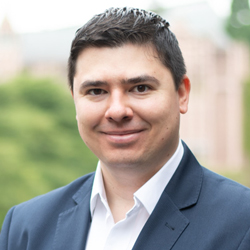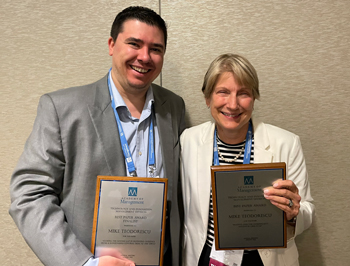
Mike Teodorescu, an assistant professor at the University of Washington Information School, recently marked his arrival by taking top honors in the Technology Innovation Management Division (TIM) at the 82nd Annual Meeting of the Academy of Management in Seattle.
Teodorescu is a co-author of both the Best Paper Award Winner and the Best Paper Runner-up Award of the TIM division at the conference, which selected one best paper and two runners-up out of more than 600 submissions. The papers are co-authored with Dr. Andrew Toole, Chief Economist of the U.S. Patent and Trade Office (USPTO); Dr. Nicholas Pairolero, Senior Research Economist at the USPTO; Dr. Charles de Grazia, Professor at EMLV Paris; and Peter-Anthony Pappas, Supervisory Patent Examiner at the USPTO currently on detail to the U.S. Senate Committee on the Judiciary.
The Academy of Management focuses on research, teaching and practice in the field of management and organization. The Technology and Innovation Management Division, which brings together scholars interested in innovation, research and development, and the management of technology-based organizations, has about 3,000 members.
The papers are concerned with pro se — or self-represented — inventors seeking patents. Individual inventors often struggle with the patent process when they don’t have the resources to hire lawyers, an expense that can run in the tens of thousands of dollars. The paper evaluated the Pro Se Pilot program, which provided additional guidance for pro se inventors to navigate the process. The authors found that such interventions were highly effective, increasing the likelihood that inventors would acquire patents, allowing them to sell their inventions and build their technologies out by applying for more patents in the future.
“They’re more productive if they go through the program, which is good because we want to have more engagement, more patents, more innovation as a country,” Teodorescu said.

The team of USPTO managers who created the Pro Se Pilot program ran a randomized trial in 2014-15, where some patent applications proceeded through the usual process and other patent applications proceeded through a special unit of experienced patent examiners who helped guide applicants through the process. The author team then gathered data on the inventors for several years to learn the long-term effects of the interventions.
Teodorescu, who began teaching in the iSchool this fall with an introductory data science course for Master of Science in Information Management students, plans to publish the papers soon and present his findings at several upcoming conferences. He most recently co-presented the results of one of the two papers at the EPIP 2022 Conference at University of Cambridge. He also plans to write policy briefs with the goal of increasing buy-in with policymakers. He noted that with 15 people assigned to his unit, the patent examiners processed about 2,500 applications, and believes the program could scale well to the larger group of inventors associated with start-ups and small businesses.
“You could cover a lot of these applications by just increasing the size of this unit, and you could imagine hiring an additional 70 or 80 examiners who would cover the entire gap,” he said.